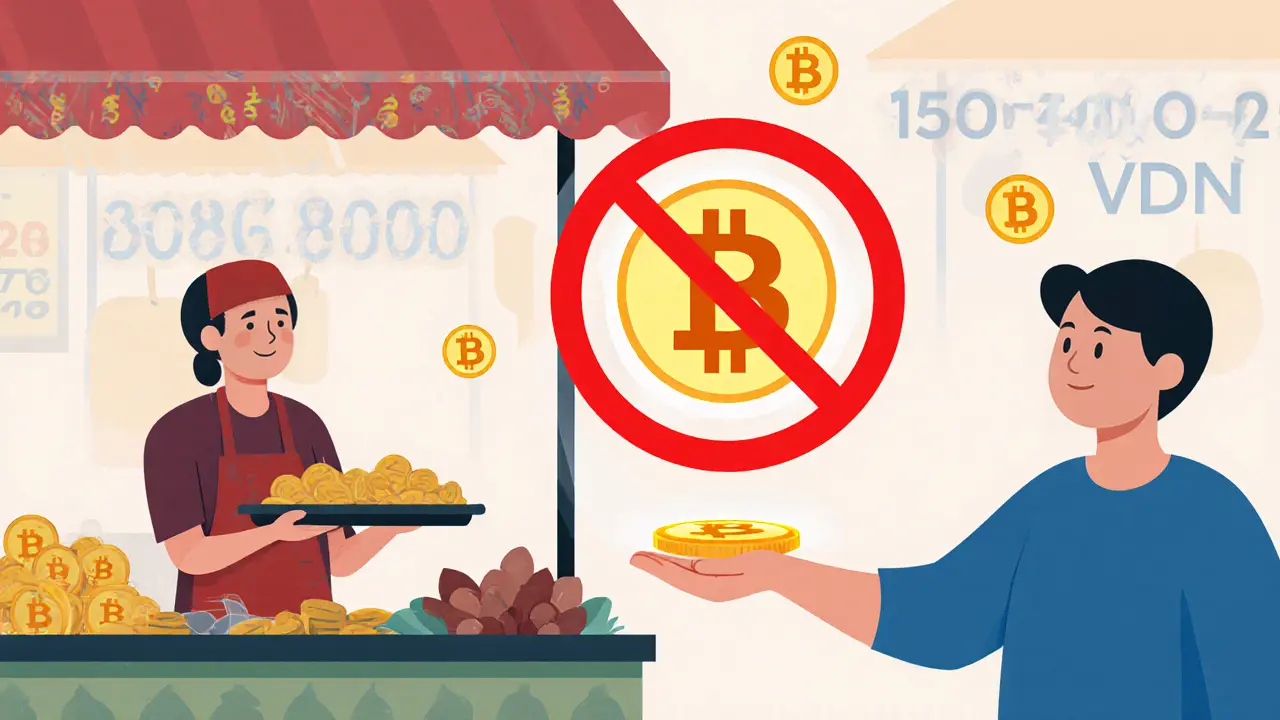Vietnam Crypto Payment Fines: 150‑200 million VND Penalties Explained
 Feb, 24 2025
Feb, 24 2025
Vietnam Crypto Fine Calculator
Calculate Fine Impact
Under Vietnam's regulations, using cryptocurrency as a payment method carries a fixed fine of 150-200 million VND ($6,500-$8,900 USD). This tool helps you understand what this fine means in practical terms.
This is a fixed penalty regardless of transaction size. The fine is enforced when cryptocurrency is used as payment for goods or services according to Decree No. 96/2014/ND-CP.
When Vietnam’s central bank started cracking down on crypto transactions, the headline was hard to miss: a fine of 150‑200 million VND for anyone caught using digital coins as a payment method. Cryptocurrency payments are defined as any transaction where a virtual currency is used to settle goods, services, or debts. The ban, enforced by the State Bank of Vietnam (SBV), has reshaped how businesses and users think about digital money in the country.
Legal Foundations of the Ban
The prohibition traces back to Decree No. 96/2014/ND-CP, which governs administrative sanctions in monetary and banking activities. Clause 6, Article 27 explicitly states that issuing, supplying, or using bitcoin and similar virtual currencies as a means of payment is a prohibited activity, with fines ranging from 150 million to 200 million VND.
Two other legal texts reinforce the ban:
- Decree 101/2012/ND-CP on non‑cash payment, later amended by Decree 80/2016/ND-CP, which lists only bank‑issued instruments as lawful means of payment.
- A directive from Prime Minister Nguyen Xuan Phuc that called for a clear legal framework on virtual assets, prompting the SBV to publish its final regulation on 28 October 2017.
These statutes create a narrow, well‑defined window: holding crypto is not illegal, but using it to pay for coffee, tuition, or rent is.
Why the Ban? Central Bank’s Rationale
SBV officials argue that crypto payments threaten monetary sovereignty and make tax compliance difficult. Le Truong Tung, president of FTP University, told Coin Intelligence that accepting Bitcoin would “make the economy quite complex and difficult to control,” citing risks of tax evasion and illegal transfers.
Academic voices echo this concern. Dr. Nguyen Xuan Thanh, former director of the Vietnam Program at Harvard’s Kennedy School, noted in a 2018 interview that Vietnam’s stance reflects “traditional central banking worries about monetary sovereignty,” even if it sidelines the technology’s innovation potential.
Enforcement in Practice: Real‑World Cases
Before the official start date of 1 January 2018, a university announced plans to accept Bitcoin for tuition. SBV intervened, warning that the move would breach the decree, and the university withdrew the proposal. The episode, documented by legal analyst ERIC KIM, showed the regulator’s willingness to act early.
After the ban took effect, the SBV coordinated additional penal sanctions, though public prosecution numbers remain low. By November 2019, the bank announced “coordinated penal sanctions for such acts involving these now illegal cryptocurrencies,” but most enforcement appears to target high‑profile merchants rather than the peer‑to‑peer market that thrives under the radar.
Community forums like Bitcoin Vietnam News reveal that users still exchange crypto via informal channels, carefully avoiding any transaction that could be traced as a payment to a business, thereby steering clear of the 150‑200 million VND fine.
Impact on the Vietnamese Crypto Ecosystem
Despite the ban, Vietnam ranks 8th globally in crypto adoption according to Chainalysis’s 2021 Global Crypto Adoption Index. The paradox stems from a strong appetite for digital assets coupled with limited legal pathways for using them in everyday commerce.
Non‑cash payments overall have grown 35% annually since 2015, driven by SBV‑backed digital banking initiatives. The ban forces users to keep crypto in wallets (as an investment) while relying on state‑approved e‑payments for daily spending. This split creates a compliance gray zone that many businesses navigate by converting crypto to VND through offshore exchanges before accepting payment.
Recent Regulatory Shifts and Future Outlook
In December 2021, a Draft Decree on Management of Virtual Assets resurfaced the prohibition on payments but hinted at treating crypto as taxable assets. The Ministry of Finance’s 2022 Draft Circular on Tax Management for Virtual Asset Transactions further signaled a willingness to tax holdings, even as the ban on payments remains untouched.
Experts like Le Hong Hiep argue that Vietnam is missing an opportunity to harness blockchain technology while focusing solely on monetary control. Meanwhile, Dr. Tran Ngoc Ca observed in a 2023 interview that “the fine remains technically enforceable but has become increasingly difficult to implement as cryptocurrency usage grows,” suggesting pressure for regulatory modernization.

Practical Guidance for Businesses and Users
If you run a shop, a restaurant, or any service in Vietnam, the safest route is to avoid accepting any cryptocurrency directly. Here’s a quick checklist:
- Never display crypto wallets or QR codes at the point of sale.
- If you receive crypto from a partner, immediately convert it to VND via a licensed exchange before recording revenue.
- Maintain clear accounting records that separate crypto holdings (investment) from ordinary sales.
- Stay updated on SBV announcements; the 2022 Monetary Policy Report reiterates the fine structure.
For individual users, the key is to keep crypto transactions off any platform that could be identified as a merchant. Peer‑to‑peer trades, decentralized exchanges, and private wallets remain the most discreet methods.
Regional Comparison of Crypto Payment Penalties
| Country | Legal status of crypto payments | Typical fine (USD) | Enforcement focus |
|---|---|---|---|
| Vietnam | Prohibited - 150‑200 million VND | $6,500‑$8,900 | High‑profile merchants, wallets linked to businesses |
| Thailand | Allowed with licensing | Up to $2,500 (unlicensed activity) | Unlicensed exchanges, illegal AML |
| Singapore | Regulated under Payment Services Act | Variable - up to $10,000 for non‑compliance | Unregistered token service providers |
The table shows Vietnam’s fines sit in the mid‑range globally but are stricter than Thailand’s licensing model and comparable to Singapore’s broader regulatory penalties.
Bottom Line
The 150‑200 million VND penalties are real, backed by multiple decrees, and enforced when crypto meets a commercial transaction. Yet, the ecosystem adapts: investors hold crypto, merchants convert it offshore, and the government quietly nudges tax‑compliant reporting. If you’re planning to operate in Vietnam, treat crypto as an investment‑only asset and steer clear of any payment‑related usage unless the legal landscape notably shifts.
Can I legally hold cryptocurrency in Vietnam?
Yes. Holding crypto is not prohibited, but using it to pay for goods or services violates Decree 96/2014/ND‑CP and can trigger a 150‑200 million VND fine.
What exact activities are punishable?
Issuing, supplying, or accepting bitcoin or other virtual currencies as a payment method, including QR‑code payments, point‑of‑sale transactions, and invoicing in crypto.
How often does the SBV actually fine businesses?
Public data on exact numbers is scarce, but high‑profile cases-such as the 2017 university payment plan-show the SBV will act quickly when a merchant publicly announces crypto acceptance.
Is there any way to avoid the fine while still using crypto?
The safest approach is to keep crypto transactions strictly peer‑to‑peer and convert any received crypto to VND through a licensed exchange before using it for business purposes.
Will Vietnam ever relax the payment ban?
Recent drafts hint at treating crypto as a taxable asset, but the ban on payments remains unchanged. A major policy shift would likely require new legislation and a clear framework for oversight.
Lawrence rajini
October 25, 2025 AT 23:45Will Barnwell
October 26, 2025 AT 16:36Matt Zara
October 26, 2025 AT 21:10Jean Manel
October 27, 2025 AT 00:38William P. Barrett
October 27, 2025 AT 19:54Cory Munoz
October 28, 2025 AT 03:20Jasmine Neo
October 28, 2025 AT 04:25Ron Murphy
October 29, 2025 AT 02:21Prateek Kumar Mondal
October 30, 2025 AT 00:27Nick Cooney
October 30, 2025 AT 14:33Clarice Coelho Marlière Arruda
October 30, 2025 AT 16:04Brian Collett
October 31, 2025 AT 10:56Allison Andrews
November 1, 2025 AT 05:51Wayne Overton
November 1, 2025 AT 07:29Alisa Rosner
November 1, 2025 AT 22:32MICHELLE SANTOYO
November 2, 2025 AT 17:02Lena Novikova
November 3, 2025 AT 14:46Kevin Johnston
November 3, 2025 AT 15:34Dr. Monica Ellis-Blied
November 3, 2025 AT 17:35